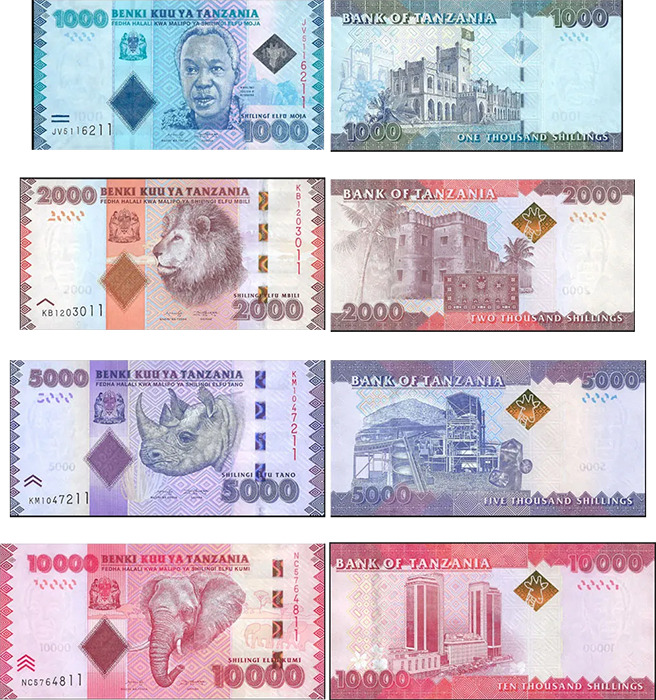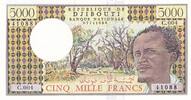MA-ID: 20003336200220
Évaluations Numiscollection
Fast shipping and precisely described. Highly recommend.
Good and fast service.
Nice packaging and delivery
Excellent service.
Tanzanie 2019-2020 Série 4 billets 1000, 2000, 5000, 10.000 Schillingi - 2019/2020 NEUF
Numiscollection 

14
Sur MA-Shops depuis 14 années
13699 évaluations,
99,6 % Positif ( derniers 24 mois )
Expédition dans le monde entier
30,45 EUR
TVA n'est pas applicable ou ne peut pas être indiqué sur la facture.
+ 6,50 EUR frais d'envoi ( vers France métropolitaine )
Délai de livraison : 2 à 3 jours
+ 6,50 EUR frais d'envoi ( vers France métropolitaine )
| +49 (0)2871 2180 383 |
| Modes de paiement |
| virement bancaire |
NEUF | Abréviation
1,00 g
Julius Nyerere, also known as Mwalimu ("teacher" in Swahili), was an iconic figure in the struggle for independence and the first president of Tanzania. Here is an overview of his life and impact:
Early Life and Education
- Born: April 13, 1922, in Butiama, Tanganyika (now Tanzania).
- Education: After completing primary and secondary school in Tanganyika, he pursued further studies at Makerere University in Uganda. Later, he earned a degree in history and economics from the University of Edinburgh in Scotland, becoming the first Tanganyikan to obtain a British university degree.
Political Career and Struggle for Independence
- Formation of TANU: In 1954, Nyerere co-founded the Tanganyika African National Union (TANU), which became the principal movement for independence.
- Independence: Through his efforts in mobilization and negotiation skills, Tanganyika achieved peaceful independence on December 9, 1961, with Nyerere as Prime Minister. In 1962, Tanganyika became a republic, and Nyerere became its first president.
- Union with Zanzibar: In 1964, Nyerere played a key role in the merger of Tanganyika and Zanzibar to form Tanzania.
Domestic Policy
- Ujamaa: Nyerere is known for his Ujamaa (African socialism) policy, based on traditional communal values aiming to create an egalitarian society. He promoted the collectivization of villages to stimulate rural development.
- Nationalization: Under his leadership, many industries and banks were nationalized to strengthen state control over the economy.
Challenges and Criticism
- Economy: Although his policies had noble ideals, they often failed to produce the expected economic results, leading to inefficiencies and shortages.
- Reforms: In the 1980s, faced with economic pressures and the failures of socialist policies, Tanzania began adopting market economic reforms.
Retirement and Legacy
- Retirement: In 1985, Nyerere voluntarily left the presidency, making way for Ali Hassan Mwinyi, but remained an influential figure as the chairman of the Chama Cha Mapinduzi (CCM) party.
- Mediation: After retirement, Nyerere played an important role as a mediator in regional conflicts, notably in Burundi and Rwanda.
- Death: Julius Nyerere died on October 14, 1999, in London, United Kingdom.
Legacy
Julius Nyerere is celebrated for his dedication to national unity, personal integrity, and commitment to education and social justice. Despite economic challenges, he remains a respected and beloved figure in Tanzania and beyond for his contributions to liberation and nation-building.
Info / FAQ
| Frais d'envoi | ||
|---|---|---|
| jusqu`à 450,00 EUR | plus de 450,00 EUR | |
| France métropolitaine | 6,50 EUR | Envoi gratuit |
| Union Européenne | 8,00 EUR | Envoi gratuit |
| Monde | 10,00 EUR | 10,00 EUR |
Tanzanie 2019-2020 Série 4 billets 1000, 2000, 50...
Numiscollection
30,45 EUR
Aus Ansicht entfernen
Shipping Info
Les ventes en ligne sont possible, livraisons internationales parfois avec un peu de retard
|
Page d'accueil de cette boutique | 0Panier | CGV | Mentions légales | MA CGV | Déclaration de protection de données | Garantie | MA-Shops Nouveautés Copyright ® 2001-2025, MA-SHOPS Coins All Rights Reserved. Designated trademarks and brands are the property of their respective owners. |
 Monnaies et billets
Monnaies et billets
























